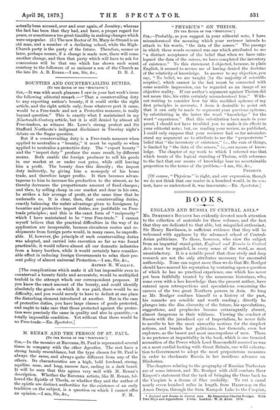" PHYSICUS " ON THEISM.
(TO THE EDITOR OF THE " SPECTATOR:•] SIB,—Probably, as you suggest in your editorial note, I have misunderstood the meaning which your reviewer intends to attach to his words, " the data of the senses." The passage in which these words occurred was one which attributed to me " a distinct acceptance of the belief that when we have cata- logued the data of the senses, we have completed the inventory of existence." To this statement I objected, because, in plain English, it seemed to accuse me of having denied the doctrine of the relativity of knowledge. In answer to my objection, you say, " No belief, we are taught [by the majority of scientific sceptics], which cannot in the last resort be connected with some sensible impression, can be regarded as an image of an objective reality. If our author's argument against Theism did not mean this, his critic certainly misunderstood him." With- out waiting to consider how far this modified epitome of my first principles is accurate, I deem it desirable to point out that it can only be made to represent your previous epitome, by substituting in the latter the word " knowledge " for the word " experience." Had this substitution been made in your proof, I should not have troubled you to make it (in effect) in your editorial note ; but, on reading your review, as published,. I could only suppose that your reviewer• had so far misunder- stood my argument as to attribute to me the " preposterous " belief that " the inventory of existence," i.e., the sum of things, is limited by " the data of the senses," i.e., our means of know- ledge. The chapter of my work to which I referred was that which treats of the logical standing of Theism, with reference to the fact that our means of knowledge bear no ascertainable proportion to the terms of the problem.—I am, Sir, &c.,
PHTSICUS.
[Of course, " Physicus " is right, and our expression, though we do not think that one reader in a hundred would, in its con- text, have so understood it, was inaccurate.—En. Spectator.]


































 Previous page
Previous page